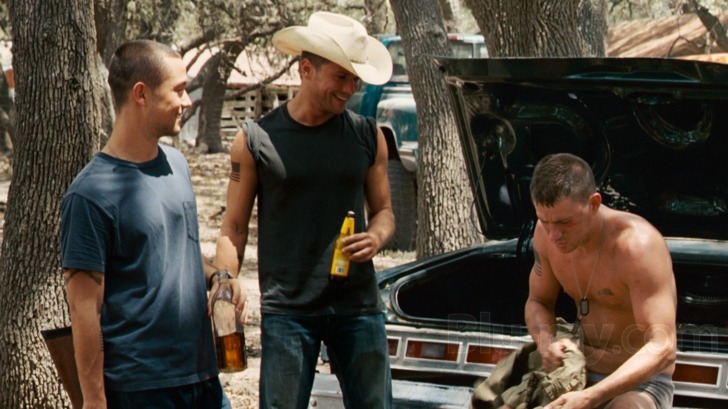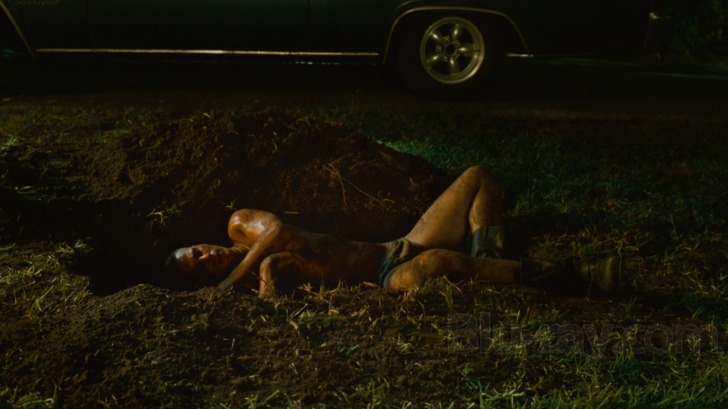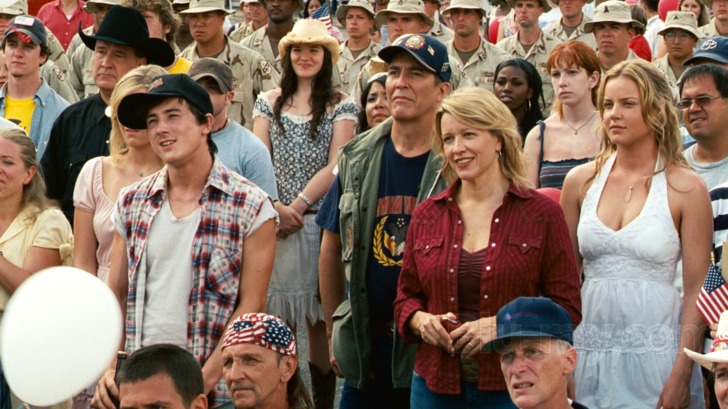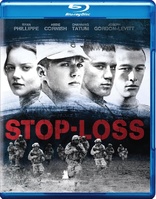Stop-Loss Blu-ray Movie
HomeStop-Loss Blu-ray Movie 
Warner Bros. | 2008 | 112 min | Rated R | Feb 04, 2014Movie rating
6.3 | / 10 |
Blu-ray rating
| Users | 0.0 | |
| Reviewer | 4.5 | |
| Overall | 4.5 |
Overview
Stop-Loss (2008)
Decorated Iraq war hero Sgt. Brandon King makes a celebrated return to his small Texas hometown, believing that his tour of duty is over. When the Army orders him back to Iraq under the fine print in his enlistment contract, the action tests everything he believes in.
Starring: Ryan Phillippe, Abbie Cornish, Channing Tatum, Joseph Gordon-Levitt, Ciarán HindsDirector: Kimberly Peirce
| War | Insignificant |
| Drama | Insignificant |
Specifications
Video
Video codec: MPEG-4 AVC
Video resolution: 1080p
Aspect ratio: 1.78:1
Original aspect ratio: 1.85:1
Audio
English: DTS-HD Master Audio 5.1 (48kHz, 24-bit)
French: Dolby Digital 5.1 (640 kbps)
Spanish: Dolby Digital 5.1 (640 kbps)
Subtitles
English SDH, French, Spanish
Discs
50GB Blu-ray Disc
Single disc (1 BD)
Playback
Region A (B, C untested)
Review
Rating summary
| Movie | 4.5 | |
| Video | 4.5 | |
| Audio | 4.5 | |
| Extras | 3.5 | |
| Overall | 4.5 |
Stop-Loss Blu-ray Movie Review
Catch 22½
Reviewed by Michael Reuben February 3, 2014Stop-Loss began with the enlistment of director Kimbely Peirce's younger brother after the terrorist attacks of 9/11. Deployed to Iraq, he kept in almost daily contact with his older sister by Instant Message. With the aid of her brother's correspondence, Peirce saw the war through a soldier's eyes. She also gained access to videos shot by soldiers of themselves and each other and sent home to their families. They moved her both as a family member and a filmmaker. In 2005, Peirce began touring America to interview returning soldiers and those to whom they returned. Some she talked to in person, others by phone. In the process, she discovered the military's "stop-loss" program, which relied on a provision of the standard enlistment contract that was being applied more frequently as the conflicts in Iraq and Afghanistan continued longer than initially expected. The provision allows the military to extend an enlistee's deployment beyond the originally stated term and, in time of war, extend the period of enlistment until after the war is over. Stop-loss has been called "a backdoor draft" (a phrase that Peirce incorporated into the film). Estimates vary, but anywhere from 58,000 to 81,000 troops were returned to Iraq or Afghanistan for additional tours under the stop-loss program. Recognizing the inherent drama in the plight of a soldier who comes home breathing a sigh of relief at having survived, only to be told he has to go back, Peirce and co-writer Mark Richard (Huff) began writing a script. As they progressed through an estimated 65 drafts, the writing partners expanded their story to encompass everything they had learned—from soldiers, from their families, from the military itself—about the experience of returning home after combat in the Middle East. They wanted to explore, as honestly as possible, the challenges experienced by the much-altered returnees and the loved ones eager to welcome them home. Some of these issues are so common that the military gives classes to wives and fiancées on how to deal with the men they used to know. Stop-Loss was released by Paramount's MTV Films division, and like every other film dealing with the war on terror and its aftermath (at least, until Zero Dark Thirty), it did poorly at the box office, despite strong reviews. With U.S. troops now out of Iraq and leaving Afghanistan, the film is due for a second look.

Four soldiers from the same small town in Texas form the core of Stop-Loss. Their unit commander, Sgt. Brandon King (Ryan Phillippe), is the one who is brought up short by a stop-loss order. His best friend since childhood, Steve Shriver (Channing Tatum), plans to be married to local girl Michelle (Abbie Cornish) as soon as they return home. Their long-time friend, Tommy Burgess (Joseph Gordon-Levitt), already has a wife, Jeanie (Mamie Gummer), eagerly awaiting his return. Rico Rodriguez (Victor Rasuk) comes from another part of town, but he has become their brother in combat, as happens among soldiers who discover that, whatever their impetus for joining up, their primary mission once they arrive is to look out for the members of their unit who are looking out for them. The film opens with a hellish urban street battle against insurgent forces. The production went to Morocco to find an appropriate location, and military advisor James Dever, a Marine veteran of the Iraq conflict, oversaw the fight choreography to ensure realism. Sgt. King loses several of his men, others are injured, and numerous civilians are killed or injured. King emerges from the experience blaming himself, even though he has saved the lives of both Rodriguez and his best friend, Shriver. When the unit returns home, King finds himself being pinned with medals before a cheering hometown crowd waving flags and banners, but he cannot reconcile his sense of failure with the patriotic display before him. Still, he continues to play squad commander by, among other things, helping Shriver and Burgess observe the list of "don'ts" recited by their commanding officer, Lt. Col. "Boot" Miller (Timothy Olyphant), just before letting them loose—simple things like "don't drive drunk", "don't fight with civilians", "don't hit your wife or girlfriend". The cautions may seem obvious, but Boot's speech is based on real warnings given to returning soldiers. Within twenty-four hours of their return, King finds himself having to intervene on behalf of both Shriver and Burgess. (Rodriguez is still recovering from his injuries.) Both show classic signs of PTSD (flashbacks, sudden outbursts of rage), and King considers it his duty, as both friend and fellow soldier, to rush to their aid in their rocky transition to civilian life. But King is soon fighting his own battle, when he goes to pick up his discharge papers and discovers that he's been stop-lossed. The same quickness of temper displayed by his buddies boils over in a confrontation with his own commander, "Boot". Before King realizes what he's doing, he is on the run, determined to fight the stop-loss order but unsure how. His devastated mother (Linda Emond) wants him to flee to Mexico, while his father (Ciarán Hinds) counsels acceptance. Without any clear idea of what he'll say, King sets off to seek the help of Senator Worrell (Josef Sommer), who was there for the photo op when King returned home and offered his help if King ever needed it. King's quest for the Senator's help is a futile one, and the audience knows it. What member of Congress would risk countermanding the military (or would even have the power to do so) in a time of national emergency? But this is the first time in his life that King has found himself at odds with "the system", and he's in unknown territory, accompanied by Michelle, because she volunteers to give him a ride. In their travels, they stumble across an underground of stop-lossed soldiers living as fugitives and a lawyer (Peter Gerety) helping them get new identities in Canada (if they can afford it). King also discovers in himself the same symptoms he observed in his buddies, when a chance encounter triggers a reaction from him that nearly proves fatal. Stop-Loss doesn't stint on showing the war's toll. King visits the devastated family of a soldier who died during the opening street battle, because he feels it's his duty to tell the man's parents (Laurie Metcalfe and co-writer Mark Richard) about their son's final moments, but you can see him struggling for the right balance. He wants to say enough to give them closure but not so much that they're left with nightmares. And King and Michelle visit Rodriguez in the hospital. Despite crippling injuries, he is more positive than his three buddies who emerged without physical scars. He is simply glad to be alive. Peirce and Richard tried several different endings to King's quest for the Senator's intervention. Several are included in the deleted scenes, but the one ultimately chosen for the film is the simplest and most straightforward. It puts the focus most sharply on the real issue, which is King's own need to look inward and decide who he is and what he really wants. In one way or another, each of the main characters must do the same thing. When the military transport departs at the end of Stop-Loss, some of the original quartet are aboard and some are not. Some who were there to welcome them home are waving goodbye, and some are absent. But as soon as the bus pulls away from the crowd, those inside look at each other, and we watch the familiar mindset kick in: Where they're going, the only thing that matters is the guy sitting next to you.
Stop-Loss Blu-ray Movie, Video Quality 

Throughout her commentary, director Peirce notes the substantial contributions of Oscar-winning cinematographer Chris Menges (The Killing Fields ) to the look of Stop-Loss, whether through his insistence on creating lighting that appears to come from sources inherent to the scene (e.g., a huge canopy of tiny lights strung below the ceiling of a bar where the soldiers celebrate their first night home) or his fluid camera movements (especially during the opening firefight). Unlike Menges' earlier films, Stop-Loss was finished on a digital intermediate, and Peirce says that considerable effort was made in post-production to use color as an instant visual cue distinguishing between soldiers' videos and the film itself. Warner's 1080p, AVC-encoded Blu-ray of this Paramount catalog title has presumably been sourced from digital files, and it is excellent. Clarity, sharpness and detail are consistently fine throughout, except in the soldiers' videos, where they fall off somewhat, deliberately so, to convey a homemade quality. Black levels are solid and deep, which becomes especially important in critical night scenes. The color palette varies widely, beginning with the washed out brightness under the Iraqi sun, followed by the warm, welcoming hometown hues of Texas but shading into the unsettling and almost pulpy intensity of the soldiers' waking nightmares and the back alleys where King and Michelle find themselves hiding from the law. The disc's average bitrate of 23.84 falls within Warner's usual range. Stop-Loss has demanding passages of frenetic action, but it also has long sections of quiet conversation. The compression balances the two for maximum efficiency, and the Blu-ray image appeared to be free from artifacts. (Messages that I have received about previous Paramount titles released under the Warner licensing deal for the U.S. and Canada prompt me to reiterate that Paramount provides the transfer/digital capture and the extras, while Warner does the compression, authoring and menu design.)
Stop-Loss Blu-ray Movie, Audio Quality 

Stop-Loss's 5.1 sound mix, presented here in lossless DTS-HD MA, rises effectively to the big moments, especially the opening firefight, with an aggressive surround mix that immerses the viewer in the different environments to which the soldiers must adjust. The chaos of a fast-moving street battle is punctuated by gunfire, RPG explosions, concussion grenades, falling rubble, flames and yelling voices, and the mix places these sounds throughout the listening space. A similarly enveloping but very different kind of sound can be heard when the main characters return home to a big celebration and parade, and again in the giant bar where singer Ricky Calmbach leads a Texas swing band. The sound mix becomes more interior and subjective as the film's focus narrows in on Sgt. King, but the soundtrack (supervised by Randall Poster) still has room for well-chosen musical selections. (On the commentary, Peirce describes how one key scene didn't work until it was set to Creedence Clearwater Revival's "Born on the Bayou".) Dialogue is generally clear, and the underscoring by John Powell (Face/Off) has the driving force of a suspense film.
Stop-Loss Blu-ray Movie, Special Features and Extras 

The extras have been ported over from Paramount's 2008 DVD of Stop-Loss.
- Commentary with Director Kimberly Peirce and Co-Writer Mark Richard: This commentary appears to have been pieced together from several sessions, one of which is identified as having been recorded in December 2007, before the film's release, and one or more later sessions. Richard is present in only one session, and his comments are limited. Both he and Peirce speak about the script's development, including story points that were considered and even written, but ultimately rejected for one reason or another. Peirce identifies numerous elements that were taken from stories told by returning soldiers and their families, and describes how the actors prepared for their roles. She also talks about early audience reactions.
- The Making of Stop-Loss (480i; 1.78:1, enhanced; 20:59): This informative behind-the-scenes documentary includes interviews with Peirce, Richard and the principal cast, along with production footage shot in Morocco as advisor James Dever choreographs the firefight between Sgt. King's unit and insurgent forces. Peirce is also seen doing several of the many interviews that provided the raw material for the film.
- A Day in Boot Camp (480i; 1.78:1, enhanced; 10:03): Dever describes the condensed version of basic training that the cast underwent to prepare for filming.
- Deleted Scenes (w/Optional Commentary by Kimberly Peirce) (480i; 1.85:1; 18:43): A "play all" option is included.
- Hometown Cooking
- Roy King and Son
- Leaving the Base
- Need a Ride to Austin
- Dropping Shorty Off
- Michelle Offers to Drive
- Veterans Support Network
- Check Out
- D.C. Visit
- Senator Worrell
- Beach
Stop-Loss Blu-ray Movie, Overall Score and Recommendation 

Every war generates a cinema specific to its circumstances, but film is much better at expressing emotional experience than intellectual analysis. The plight of individual soldiers and the gap between the rush of patriotic fervor that inspires service and the day-to-day realities of fighting and its aftermath have been a consistent source of inspiration for filmmakers precisely because the experience is so personal. King Vidor's The Big Parade didn't attempt to examine the causes of World War I or assign responsibilities for the slaughter; Vidor was more interested in showing the war as it was experienced by three very different soldiers who became unlikely comrades. William Wyler's The Best Years of Our Lives didn't undertake an analysis of the rise of Nazi Germany or Imperial Japan or the dangers of post-war Europe; it only cared about what happened to three American soldiers who came home from the fighting. Stop-Loss falls squarely in this tradition, but the public didn't show for it, which is a shame. It's a powerful, moving film on an important subject. Highly recommended.
Similar titles
Similar titles you might also like

The Best Years of Our Lives
1946

Lions for Lambs
2007

The Messenger
2009

Last Flag Flying
2017

Whiskey Tango Foxtrot
2016

Love and Honor
Love & Honor
2013

The Young Lions
Limited Edition to 3000 - SOLD OUT
1958

Crossing Over
2009

Hyena Road
2015

Billy Lynn's Long Halftime Walk 4K + 3D
2016

The Big Parade
Warner Archive Collection
1925

The War at Home
1996

The Deer Hunter 4K
Collector's Edition
1978

Coming Home
Special Edition
1978

The Lucky One
2012

A Walk in the Sun
1945

Dr. Strangelove or: How I Learned to Stop Worrying and Love the Bomb 4K
1964

Sands of Iwo Jima
1949

Armored Attack!
The North Star
1943

They Were Expendable
Warner Archive Collection
1945

